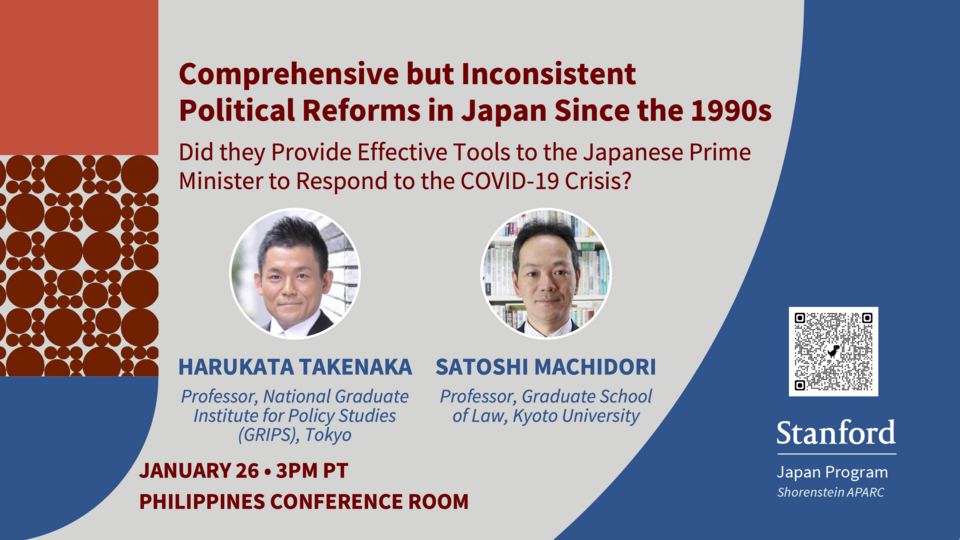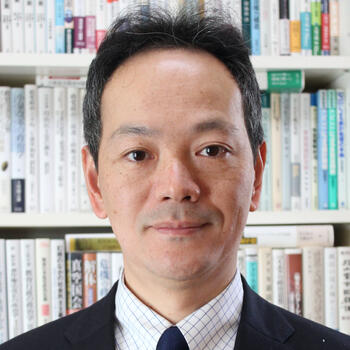Comprehensive but Inconsistent Political Reforms in Japan since the 1990s: Did they provide effective tools to the Japanese prime minister to respond to Covid-19 crisis?
Comprehensive but Inconsistent Political Reforms in Japan since the 1990s: Did they provide effective tools to the Japanese prime minister to respond to Covid-19 crisis?
Thursday, January 26, 20233:00 PM - 4:00 PM (Pacific)
Encina Hall, Third Floor, Central, C330
616 Jane Stanford Way, Stanford, CA 94305

Since the 1990s, Japan has implemented a series of reforms to its political institutions, starting with the electoral system reform of 1994. The reforms were comprehensive but included different orientations. While some reforms were centripetal, concentrating power within the hands of the prime minister, other reforms were centrifugal, taking power away from the central government.
This workshop examines why Japan implemented inconsistent reforms. It demonstrates that the reforms did not provide the Japanese prime ministers enough power to deal with the COVID-19 pandemic and explores how they formulated policies to respond to the crisis, overcoming the lack of legal authority.
Speakers

Harukata Takenaka is a professor at the National Graduate Institute for Policy Studies (GRIPS) in Tokyo. He holds a PhD from Stanford University and a Bachelor of Laws from the University of Tokyo.
His key research areas are the role the prime minister in Japanese politics, changes in Japanese external policy, and democratization in Pre-war Japan.
Prof. Takenaka’s recent publications include: “Kyokoku Chugoku” to Taijisuru Indo-Taiheiyo Shokoku [Indo-Pacific Nations facing China aspiring to be a “Great Country”](edited) (Tokyo: Chikura Shobo, 2022), “Evolution of Japanese security policy and the House of Councilors,” Japanese Journal of Political Science, 22:2, (June 2021), 96-115, Korona Kiki no Seiji [Politics of Covid 19 Crisis](Tokyo: Chuo Koron Shinsha, 2020), “Expansion of the Japanese prime minister’s power in the Japanese parliamentary system: Transformation of Japanese politics and the institutional reforms,”Asian Survey,59:5:844-869 (September 2019); Futatsu no Seiken Kotai [Two Changes of Government] (edited) (Tokyo: Keiso Shobo, 2017); Failed Democratization in Prewar Japan (Stanford University Press 2014)

Satoshi Machidori is a professor of political science at the Graduate School of Law, Kyoto University. He obtained his M.A. from the University of Wisconsin-Madison in 1997 and his Ph.D. from Kyoto University in 2003. His research focuses on the comparative study of political institutions such as the legislative and executive branches of government.
He has published many books and articles, mainly in Japanese, including Shusho Seiji no Seido Bunseki (The Japanese Premiership: An Institutional Analysis of Power Relations) (Tokyo: Chikura Shobo, 2012), which was awarded the Suntory Prize. His writings in English include a chapter in Examining Japan’s Lost Decades, edited by Yoichi Funabashi and Barak Kushner (London: Routledge, 2015). His latest book, Seiji Kaikaku Saiko (Tokyo: Shinchosha, 2020), will be translated into English and published by Springer in this March.
